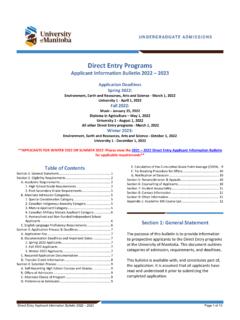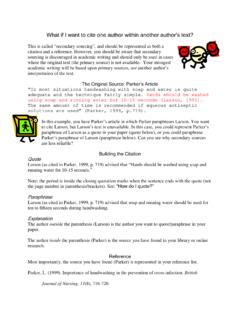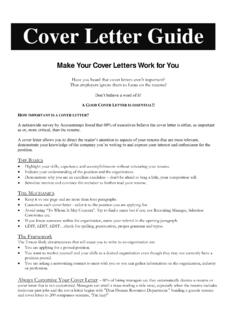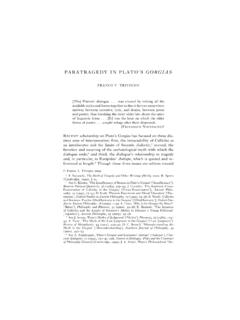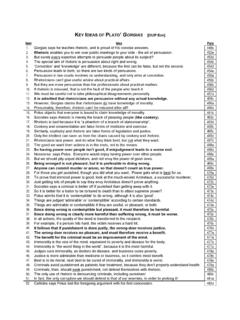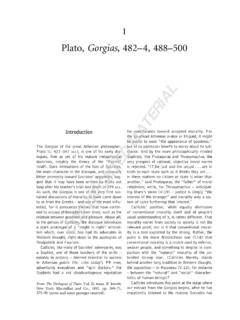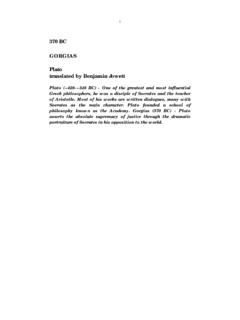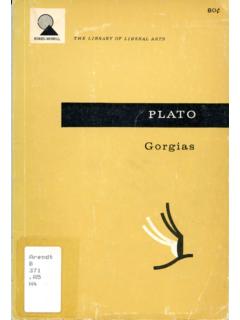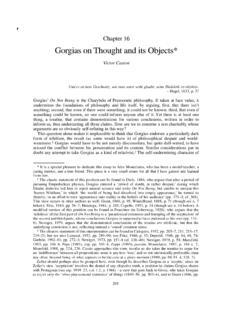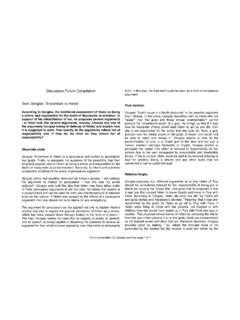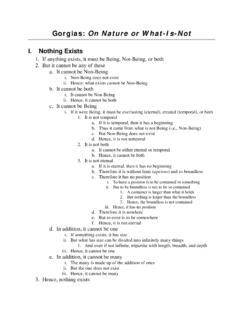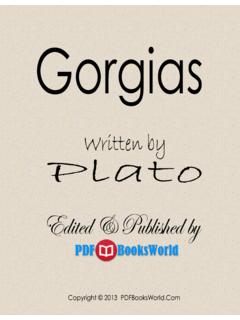Transcription of LCMND e-Journal Volume 2004/1 - University of Manitoba
1 Volume 2004 /1 LCMND e-Journal 1 LCMND e-Journal Volume 2004 /1 _____ gorgias , Polus, and Socrates on Rhetoric in Plato s gorgias by Daniel N. Erickson University of North Dakota, Grand Forks, ND _____ Introduction Rhetoric was an important part of Greco-Roman education, for it enabled politicians and others who spoke in public to persuade their audiences in an efficient and effective manner. However, there was (and still is) a danger associated with this art because, like any powerful tool, it can be misused. Just as a virtuous person can employ it to accomplish good, so can an evil one use it to do the opposite.
2 The nature of rhetoric was of interest to Plato, and he wrote about it in the gorgias . The focus of this paper is on what gorgias , Polus, and Socrates say about the subject in this dialogue and the insights concerning its essence and proper use that can be gained therefrom. The gorgias Dodds states that the gorgias is presented as a drama with five actors (6), but due to the constraints of space, only the three mentioned above will be considered in this article. The main topic of conversation between gorgias and Socrates is the definition of rhetoric. In the dialog between Polus (a follower of gorgias ) and Socrates, the emphasis is on how it should be used.
3 Socrates masterfully leads the discussions through a series of questions and answers, termed dialectic, to help all of the interlocutors understand the subject better. Nothing seems to fluster him, and even when the impatient Polus becomes agitated, he maintains his composure and keeps the discussion on track. gorgias , Polus, and Socrates: Background Each of these men is an actual historical character. gorgias was born in Sicily, where rhetoric has its roots. In the gorgias , he is clearly considered a rhetorician, not a sophist (Dodds 7), though he shared some of their characteristics, such as teaching for pay and traveling from city to city.
4 However, he differed from them in one important respect: whereas sophists believed that they could teach arete excellence, gorgias did not. Of those whom Socrates examines in the gorgias , he receives the gentlest treatment. Polus has a much harder time with Socrates, and one reason why is his impulsive nature. As Kennedy observes, his name means colt, which is suggestive of his personality (45). His coltish impatience stands in stark contrast to the professional manner of gorgias (Dodds 11). Not much is known about the historical Polus; all that is known for certain is that he was born at Acragas in Sicily, taught rhetoric, and wrote a no longer extant treatise or two on the subject (Dodds 11).
5 Volume 2004 /1 LCMND e-Journal 2We know more about Socrates. According to Ehrenberg, it is difficult to discover the real Socrates though many wrote about him (362), but there are some facts upon which there is agreement. Regarding his family, he followed in his father s footsteps and became a stonemason, his mother was a midwife, and he married Xanthippe, who bore him three sons. Most of his life was spent in Athens, and he left only to fulfill military obligations (Ehrenberg 366). Although he participated in governmental affairs on occasion, he usually stayed clear of them.
6 However, he did not keep aloof from people and enjoyed conversing with and questioning anyone who would speak with him, particularly the aristocratic youth. Eventually this angered some powerful individuals, and he was accused of corrupting the youth and introducing new gods into the state. That he was convicted and executed is well known. Besides his death, Socrates is also remembered for his teaching, though he claimed not to teach anything. He questioned men to help them know more both about themselves and about good and evil, and it was through this type of knowledge that he believed excellence could be found.
7 As we shall see, the Socratic method is not easy and can be quite frustrating. gorgias and Socrates (449A-461B) The scene for most of the gorgias is the house of Callicles, gorgias host. The first to be questioned by Socrates is gorgias , who confidently promises to answer any question that may be posed. When asked the name of his art and what he calls himself, he replies that he is a rhetorician and practices rhetoric. It seems that Socrates has asked a simple question requiring a simple answer, but this is not so since he then continues the questioning to discover exactly what he does.
8 Socrates goes on to ask gorgias whether can train others to be rhetoricians, and he asserts that he can. At this point, the conversation becomes deeper, and Socrates sets the stage for a more serious discussion by asking him to continue to reply to his questions as briefly as possible. gorgias consents, claiming that he is a master of the brief style of speaking and that nobody can speak more briefly than he. Socrates then asks, With what particular thing is its [rhetoric s] skill concerned? (449D).1 Keeping true to his promise of brevity, gorgias responds, With speech (449D).
9 Inquiring further, Socrates asks whether rhetoric deals with every kind of speech. gorgias answers that it does not, but that it enables men to speak and to understand what they say. Socrates is still not satisfied and observes that other arts, such as gymnastics and medicine, use speech and that their practitioners understand what they say about their disciplines. He then asks, Why then, pray, do you not give the name rhetorical to those other arts, when they are concerned with speech, if you call that rhetoric which has to do with speech? (450B). gorgias replies, Because, Socrates, the skill in those other arts is almost wholly concerned with manual work and similar activities, whereas in rhetoric there is no such manual working, but its whole activity and efficacy is by means of speech (450B-C).
10 This seems like a good answer, but Socrates believes that gorgias still has not captured rhetoric s essence. He maintains that other arts, like geometry and arithmetic, use speech and very little or no manual labor. When asked what subject is dealt with by rhetorical speech, he replies, The greatest of human affairs, Socrates, and the best (451D). Socrates, however, points out that this does not answer the question since other professionals would say that their arts are concerned with the greatest good for mankind. In the words of Scott, Praise doesn t define it (1).





